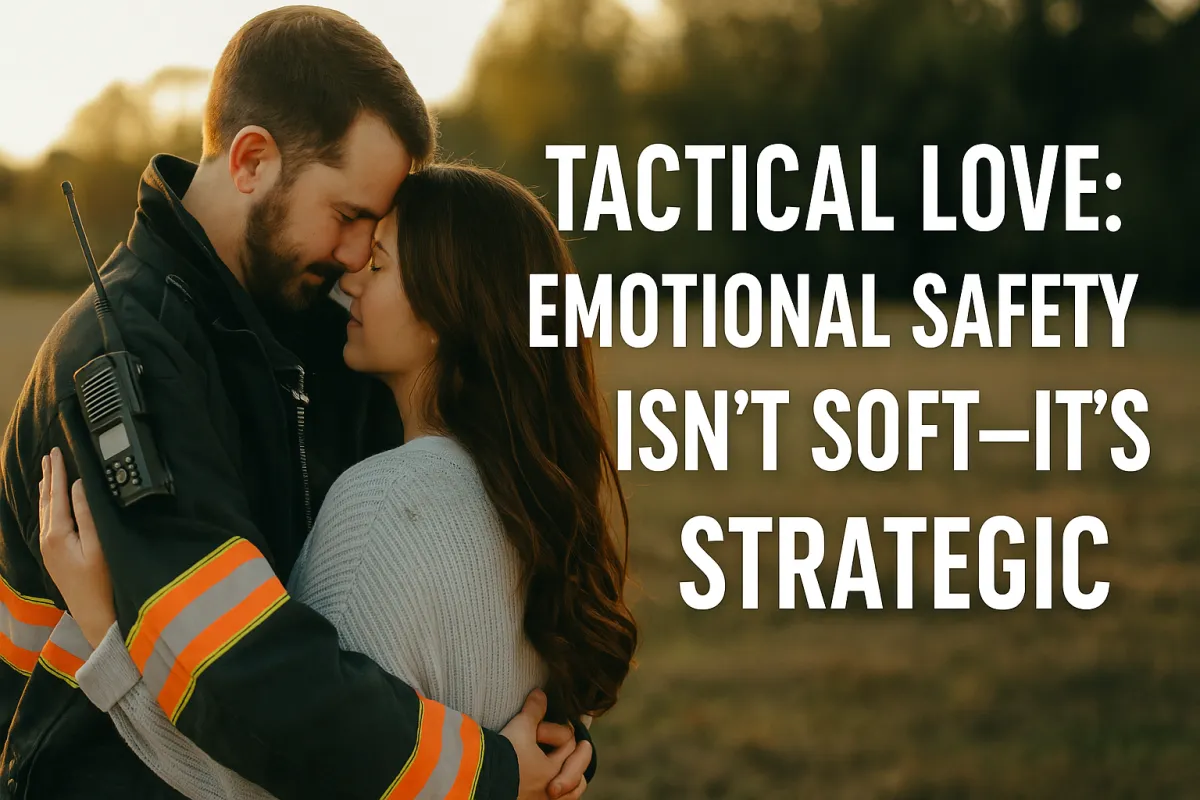
Tactical Love: Emotional Safety Isn't Soft It's Strategy
Tactical Love: Emotional Safety Isn’t Soft—It’s Strategic
By Krista Fee, M.A.
RISEUP Responders + Relationship Reset
There’s a myth we need to put to rest—right here, right now:
Emotional safety isn’t soft. It’s tactical. It’s leadership. It’s command presence at home.
And if you’re a responder, veteran, or high-stress professional who’s mastered split-second decisions, high-stakes communication, and unpredictable crisis calls—but still find yourself lost in conflict with your partner—this blog is for you.
Because love doesn’t work like a 911 call.
It’s not about control.
It’s about connection.
And connection is built through skills—not assumptions.
🎯 You Lead in Crisis—But Do You Lead at Home?
Most responders I work with say the same thing:
“I know what to do in chaos—but not in my relationship.”
Why?
Because the tactical tools that serve you in crisis—hyperfocus, suppression, authority—don’t translate well at home.
At work, you're trained to shut off emotion to get the job done.
At home, your partner is asking:
“Where are you emotionally?”
“Do you see me?”
“Can you meet me here?”
And when that demand hits a nervous system trained to compartmentalize, the internal response isn’t love—it’s shutdown. Defense. Irritation. Withdrawal.
It’s not that you don’t love them.
It’s that you were never trained to lead emotionally.
💣 The Cost of Unspoken Stress
Here’s what often happens:
You walk through the door still carrying shift tension.
You think you’re keeping it in.
But your partner feels your silence like a storm.
Your body’s telling a story your mouth isn’t.
Your eyes are distant. Your jaw is tight. Your tone is clipped.
And without explanation, your partner fills in the blanks:
“He’s mad at me.”
“She doesn’t want to talk to me.”
“I must’ve done something wrong.”
Unspoken stress turns into unspoken stories.
And those stories can destroy connection.
🧠 Why Tactical Soft Skills Matter
Let’s talk science.
Your nervous system doesn’t clock out when the shift ends.
If you’re living in sympathetic dominance—fight or flight mode—it’s hard to access empathy, patience, or curiosity.
That’s not a personality flaw. It’s neurobiology.
And when both partners are dysregulated—whether one’s a responder or not—the house becomes a battlefield.
This is why tactical soft skills matter.
Because emotional safety is a skill set, not a feeling.
You wouldn't approach a burning structure without gear.
So why are you walking into hard conversations without tools?
🛠 5 Tactical Tools for Emotional Leadership at Home
1. Do a “Readiness Assessment” Before You Engage
Before walking through the door, pause. Ask:
“Am I regulated?”
“Am I ready to be present?”
“Do I need to downshift first?”
If not, take 5 minutes to decompress—in your truck, the shower, or with intentional breathwork. Transition time is tactical time.
2. Use Direct, Grounded Check-Ins
You don’t need to give a play-by-play of your shift. But don’t ghost your partner emotionally either.
🔁 Try:
“I’m here, but I’m still decompressing. Give me 20 to reset and then I want to connect.”
This builds trust, not distance.
3. Learn the Art of Tactical Listening
Listening isn’t about solving. It’s about witnessing.
In responder culture, we’re trained to fix. But emotional connection requires holding space without judgment.
🔁 Try:
“Do you want feedback, or do you just want me to hear you right now?”
That question alone can change the tone of your relationship.
4. Use Brevity + Breath in Conflict
When things escalate, short phrases paired with breath help regulate both people.
🔁 Try:
“Let’s take 3 deep breaths before we go further.”
“I need a pause so I don’t say something I’ll regret.”
That’s not avoidance—it’s leadership.
5. Debrief Your Relationship Like You Debrief a Scene
After a disagreement, revisit it like a call review.
🔁 Try:
“What worked, what didn’t, and what do we want to do differently next time?”
This makes growth a shared mission—not a blame game.
🧍♂️ From Tactical Edge to Tactical Heart
If you’re a responder, you already have the mindset for this.
You know what it means to serve, protect, and show up in chaos.
Now it’s time to apply that same mindset to your home, your partner, and your own nervous system.
This isn’t about being “softer.”
It’s about being strategic, steady, and emotionally reliable—on and off the clock.
And if you're the partner of a responder, you matter just as much.
You deserve to feel seen, heard, and emotionally safe—even when the uniform comes off.
🔗 Ready to lead from a different kind of strength?
We’ve got two places for you:
🛡️ RISEUP Responders Community
For frontline professionals: tactical wellness, stress tools, and support systems designed to keep you grounded and connected.
📍CONNECT
💬 RISEUP Relationship Reset
For couples, partners, and individuals looking to build trauma-informed, resilient, emotionally intelligent love.
📍RISEUP Relationship Reset
Whether you're the one in uniform or the one who loves them—there’s a place for you here.
🏷 #RISEUPResponders #TacticalLove #RelationshipReset #EmotionalSafety #LeadershipAtHome #TraumaInformedConnection
